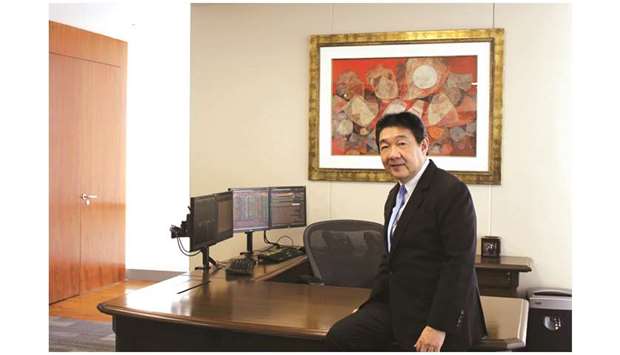For two decades, Wilson Sy produced some of the world’s biggest stock-market gains by betting on lesser-known companies outside his benchmark index.
Now, the Philippine money manager says his strategy has been upended by the flood of cash into passive investment funds – and that more stock pickers in bigger markets could face similar challenges.
After steering his flagship mutual fund to a more than 2,600% return in the two decades through 2014 – trouncing both the Philippine market and the vast majority of equity funds globally – Sy’s epic run has fizzled: He’s up just 4% over the past five years, trailing a 19% total return in the Philippine Stock Exchange Index.
Sy pins much of the blame on the historic rise of index-tracker funds, saying they’ve siphoned cash from smaller stocks and made the securities too illiquid to buy. He now sees little choice but to hew more closely to the index and try to add value through market timing - a notoriously difficult endeavour.
“It’s harder and harder” to beat the index, Sy, who founded the $235mn Philequity Fund in 1994, said in an interview in Manila. “Volume is going into more liquid stocks, so we can’t really veer away too much.”
While other money managers have raised similar concerns in the US and elsewhere, Sy says the impact on smaller markets like the Philippines has been more extreme because volumes in the countries’ off-index stocks were already relatively low.
That means they’ve not only underperformed during a bad stretch for small-cap value shares globally, but they’ve also become too thinly traded for larger funds to own.
If the shift towards index investing continues, Sy says, liquidity risks could become more pronounced in larger markets.
Of course, passive funds are attractive bogeymen for stock pickers who’ve watched billions flow out of actively managed portfolios in recent years because of growing disillusionment with high fees and lacklustre returns. Given the myriad factors that can affect market liquidity and fund returns, it’s hard to know for sure how big a role the indexing boom has played in Sy’s underperformance.
But there is evidence to support his thesis. For one, stock trading in the Philippines has become increasingly concentrated in companies with a spot in the benchmark index. Those shares accounted for about 76% of the market’s average daily turnover this year, up from 62% a decade ago. On Wednesday, just 21 of 265 Philippine shares tracked by Bloomberg had more than $1mn of daily turnover.
Meanwhile, trades that take place at the end of the day – a period when passive funds tend to execute orders – now make up as much as 30% of total volume, versus 10% in 2013, according to Richie Diaz, executive director at UBS Securities Philippines Inc Assets in passive funds tracking the Philippine equity market have grown to at least $2.2bn from about $880mn in 2014 and $55mn a decade ago, according to data compiled by Bloomberg.
“Before, stock picking was more pronounced,” said Sy, who first bought an exchange seat in 1986, the year Philippine dictator Ferdinand Marcos was ousted from office and democracy returned to the island nation. “Now, it’s more liquidity. It’s passive funds that are pushing the market.” Some investors, most notably Michael Burry of “The Big Short” fame, have responded to the rise of passive investing by making contrarian bets on overlooked small-cap stocks in markets like the US, Japan and South Korea.
But in the Philippines, where daily trading amounts to about 0.04% of that in the US, liquidity constraints argue for the opposite approach, Sy says.
While the 66-year-old former Philippine exchange chairman hasn’t totally abandoned wagers on smaller companies, they comprise a shrinking proportion of his portfolio. Sy’s top holdings in the Philequity fund as of Sept. 30 were SM Investments Corp, Ayala Land Inc, SM Prime Holdings Inc and BDO Unibank Inc – the four stocks with the biggest weightings in the benchmark index.
“The dilemma today is striking the right balance between big liquid names and small stocks that are quite cheap and offer value,” he said.
Sy’s plan for a new Philequity international fund underscores his evolving strategy. Instead of picking individual stocks for the fund, he intends to make bets on global market trends using macroeconomic analysis.

Sy: Making huge gains by betting on lesser-known companies.
